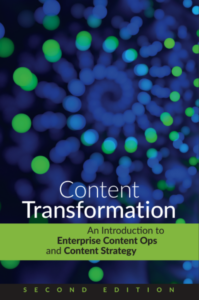Perils of DITA publishing, part 5: Free and paid editions
In which we decide to give away content.
We have print, EPUB, and Kindle editions available for Content Strategy 101. In addition, the content is available—free—on contentstrategy101.com.
We made the HTML version available fairly early in the development process, which allowed us to get feedback and comments from early readers. The early access did not replace traditional proofreading or technical reviews—as the book got closer to done, we had a couple of volunteers who agreed to do in-depth reviews.
The web site platform is WordPress. During development, Dick Johnson of VR Communications converted the DITA content via XHTML to WordPress using a Python script. For the final version, we exported to XHTML and then used a WordPress plugin. We considered other options, but WordPress is easiest for us to maintain. We decided against a wiki because we wanted comments but not edits. This helped us (sort of) preserve the separation between the author and the reader/contributor. We were concerned about the level of commitment required to edit wiki pages—leaving a comment seems like an easier option for readers.
In discussions about this approach, everyone seems to understand the idea of making drafts available early. But posting the final version has raised some eyebrows among our colleagues. They wonder whether making the content available will result in lost sales for the book.
Here’s our thinking:
- Our primary agenda is to drive the conversation about content strategy and technical communication. Providing the content for free helps us with that goal. It means people who are slightly interested, but not interested enough to spend money on a book, might see our content.
- Providing content on a public web site means that Google will see and index the information.
- Although it’s nice to have the income from book sales, our primary revenue stream is consulting. The more people read the information (whether they pay for it or not), the better off we are.
- You have to sell a lot of books to equal a single consulting project.
For readers, we are providing a lot of choices:
- Print, $29.95 list price. 182 pages, paper with a cute duck on the cover.
- EPUB,
$9.95$9.99 - Kindle, $9.99
- HTML, free
What do you think? Which edition will you choose?



Yves Barbion
I’ve ordered the print edition on Amazon.de (EUR 24,67) because I like the duck. 😉 Other reasons for buying the book are:
* I prefer reading from paper, not from a screen.
* I put the book on my desk, so other colleagues who are interested can pick it up and read it too.
* I want to have the book signed by the author at tekom tcworld (if I have received it by then).
Sarah O'Keefe
Looking forward to catching up!
Frank Sanger
I guess I will read it on my Kindle. Why do I have to pay 4¢ more than folks with other types of e-readers? 😉
Sarah O'Keefe
Um. Good question. I think the answer is because $9.99 is the “default” Kindle price, but when we sell books directly, we use $x.95.
As a side note, when we sell Kindle editions through Amazon, we get a royalty from Amazon, but we also pay a “transmission fee,” which is based on the size of the file. For this particular book, it’s $0.19 per download. Watch this space for more information from Alan about the insanity that is navigating the ebook distribution universe.
Alan Pringle
Editor’s note: the EPUB and Kindle editions are both $9.99. I changed the EPUB pricing in the post with a very classy strikethrough.
We use .99 for electronic books and .95 for print. In the days when we distributed both print and electronic books ourselves, having the different pricing suffixes was helpful.